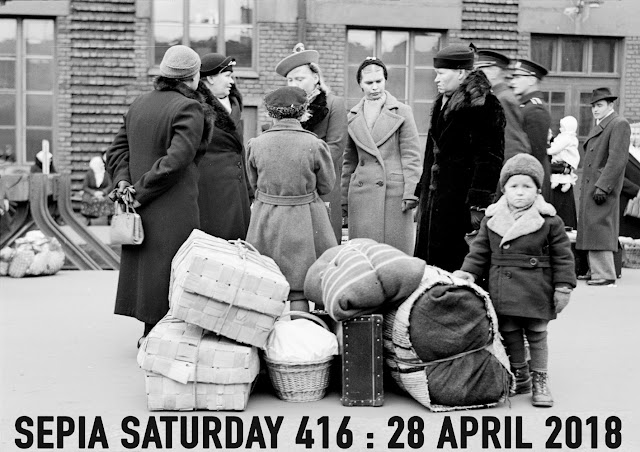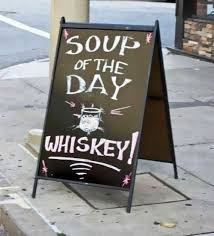Helsinki residents waiting for evacuation at the railway station. (1939)
This must have been a wrenching move for these people. Where were they going? Looking at the bags, there's one bag for each person. You wonder if that was all they could take.
~~~~~~~~~~~~~~~~
We travel frequently but have few photos of ourselves with suitcases. My husband packs meticulously and when he's finished after hours of careful folding and organizing, he's left something crucial out. I can pack in less than an hour and I rarely leave anything behind. His case looks like the ads for suitcases. Mine looks like a clothes explosion.
 |
| Guess who belongs to which suitcase. |
We've been evacuated many times when California bursts into flames somewhere, which has become a regular occurrence. It's no longer "if we have fires this year," but when we're in fire season. It's hardly the same as war, but it's leaving home behind. It's uncertainty.
Like everyone living here, we have our few precious possessions ready to go at a moments notice. Actually now that all our computer information is in the cloud, we've got back-ups for all.
On a lighter note, our cats have finally connected cause and effect, brilliant as they are. When the cases open up on the floor, they start getting very affectionate. Life changes dramatically for them when we're not here to act as doormen all day. They are forced by the cat sitter to decide on IN or OUT in the morning and they have stick to the decision all day. Poor things.
| Cashew supervising the packing |
But, the main theme of the prompt this week is leaving home.
My father's family moved from a farm at Lake Clear Ontario to Winnipeg Manitoba. They weren't evacuated and hardly under duress. But it was a huge change for them.
My Aunt Alvina Turner wrote this account of their move. She was about nine years old at the time. The family consisted of my grandmother Lucy, her much younger second husband Bertie (not mentioned here), Clem, George, Lorne, Hilda, Netta, Pearl, Percy, Joe (my father) and Alvina. They got busy in a hurry and everyone pitched in, got a job, sought out training. They worked long hours and I remember them talking (everyone got together after church on Sundays) about the pleasure they got from working hard.
 |
| Some, not all. of the family. Vina, the author of the below account wasn't born. Nor was my father. William, my grandfather, died in 1904. |
Killeen Family Move from Ontario to Manitoba
by Alvina Killeen Turner
An Excerpt
Around this time 1908-09, the slogan was “Go West Young Man.” Many of the young men listened and read the newspapers of the day—“The Ottawa Journal” and “The Family Herald” and to find better things, left the province of Ontario for Manitoba.
A visiting journalist William Curtis of the Chicago Record-Herald, had this to say to his readers:
“All roads lead to Winnipeg. It is the focal point of the three transcontinental railway lines of Canada and nobody neither manufacturer, capitalist, farmer, mechanic, lawyer, doctor, merchant priest nor laborer, can pass from one part of Canada to another without going through Winnipeg. It’s the gateway through which all the commerce of east west north or south must flow. No other city in American has such a large area. It is destined to become one of the greatest distributing and commercial centers on the continent.”
No wonder on reading such a glowing account did many families give serious thought to moving west.
Toward the latter part of 1909, the farm was offered for sale, the machinery was sold or auctioned, as was the livestock etc. and the move to Winnipeg was made. Hilda, Clem, and George set out first.
They rented a house at 590 Ross Avenue where we all lived for a short time. The rest of the family came shortly afterward.
For some reason or other, I remember very little about the actual transition. I do however recall the vast difference from the wide open spaces, the winding country roads, with farmhouses here and there along the way as we traveled to town - a road I had never been on before. There were farm buildings and horses and cattle grazing in the pastures, and a flock of sheep here and there. Here and there were rows and rows of houses; buildings larger than I had before seen, long straight roads, with a web of the main thoroughfares covered with pavement. Everything was new and different, after all the only faces and people I was familiar with were neighbors or perhaps a peddler selling Bibles or statues - that’s how we came into possession of the large Bible and also the statue of St. Anthony bought around 1905. Occasionally I was taken to the church at Kilalve there I saw a few different people. It was kind of exciting getting all dressed up with your Sunday dress usually white with a ribbon sash of pink or blue ribbon on a starched hat with streamers of the same color ( I did like the smell of incense).
No wonder on first seeing a Chinese man I was rather surprised. Their mode of dress then was a loose baggy suit - heelless shoes like thongs were worn. Their hair was in a long braid, and they were usually carrying a bag of laundry he had collected and was taking back to his place of business. The only thing they did in those days was laundry.
On occasion on the way to school we would see a negro, perhaps they were porters off the train. I don’t remember seeing any Chinese ladies then.
There were not many motor cars in the city then, most of the business used horses for deliveries, hauling coal and wood, groceries etc. This made it necessary to hire street sweepers to clean up after them. The sweepers were dressed in white and used large brooms and shovels.
I remember the first streetcars. They resembled the “Toonesville Trolly” like the one in the comic strip. They were used on Sherbrook to Logan and down Main Street around somewhere else and was called the “Belt Line”. I remember Arlington Street had a trolley car in 1914 - as I was going to St. Edward’s school then. One day a boy named Henry Jewel had been punished and he had a terrible temper so he immediately ran out of the school and lay down on the tracks. When he was discovered, two of the big grade 8 boys had to drag him off before the trolley came. This was quite a shocker for the kids that day and needless to say it was very quiet for
 |
| 1910 Main Street Winnipeg. |
the rest of the day.
Now to carry on with the beginning after they had decided to move west and everything sold, Hilda, Clem, and George left first for Winnipeg. They rented a house at 590 Ross Avenue and got a few things settled - some of the furniture was shipped and in due time everyone had a spot to call his own.
 |
| Drewry Brewery |
George brought a team of horses with him and found no problem in finding employment, as the building business was beginning to boom. Clem began work as a delivery man for the E. L. Drewery Breweries driving a team of their famous Clydesdales - which were often on postcards and if there was a parade they were in it - they were such beautiful animals.
(my Uncle Clem went on to start many successful businesses, mostly in construction. His first business in Winnipeg was a "skating rink." He cleared the snow off a patch of river and charged people to skate on it. It lasted a couple of winters until someone asked-"who is this guy and how does he get to charge for the river?" Some kind of ordinance put him out of business. For the moment.)
(my Uncle Clem went on to start many successful businesses, mostly in construction. His first business in Winnipeg was a "skating rink." He cleared the snow off a patch of river and charged people to skate on it. It lasted a couple of winters until someone asked-"who is this guy and how does he get to charge for the river?" Some kind of ordinance put him out of business. For the moment.)
Hilda started to work at Mr. Moss’ store on Isabel and Ross as a clerk in his grocery and fruit store. Till then I had never seen an orange or banana!
Lorne went to work for the C. P. R. freight a rather hard job for a young lad started at 7 AM and worked until 6 PM. I guess he got 25 or 30 cents an hour. He always gave me 10 cents on payday and I was happy with it. However, he found time and energy enough to enroll in a course at night school taking bookkeeping.
The rest of us started school at the Immaculate Conception Academy on Austin Street. It was quite a long walk about three miles.
The area where the school was located was known as the North end and quite close to the business district on Main Street. There were meat markets, grocery stores and a bakery --a few small hotels the Brunswick, Nugget and the West. One of the shops was owned by the Halperins, a wholesale meat co. - Monty Hall of Let’s make a Deal was one of them.
| Monte Hall |
From Wikipedia: Hall was born as Monte Halparin in Winnipeg, Manitoba, on August 25, 1921,[2] to Orthodox Jewish parents, Maurice Harvey Halparin,[3] who owned a slaughterhouse, and Rose (née Rusen).[4] He was raised in Winnipeg's north end,[5] where he attended Lord Selkirk School (Elmwood, Winnipeg), and, later St. John's High School.[6] Hall graduated with a Bachelor of Science degree from the University of Manitoba, where he majored in chemistry and zoology.[4] He had hoped to go on to medical school, but was not admitted due to secret quotas restricting the number of Jewish students admitted.[7]
 |
| Not the actual watch but just like it. |






